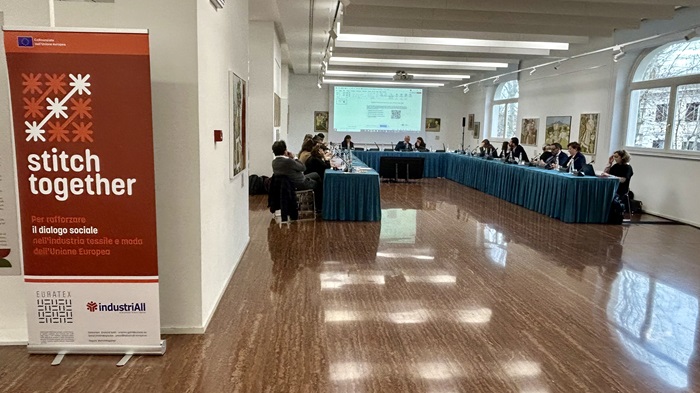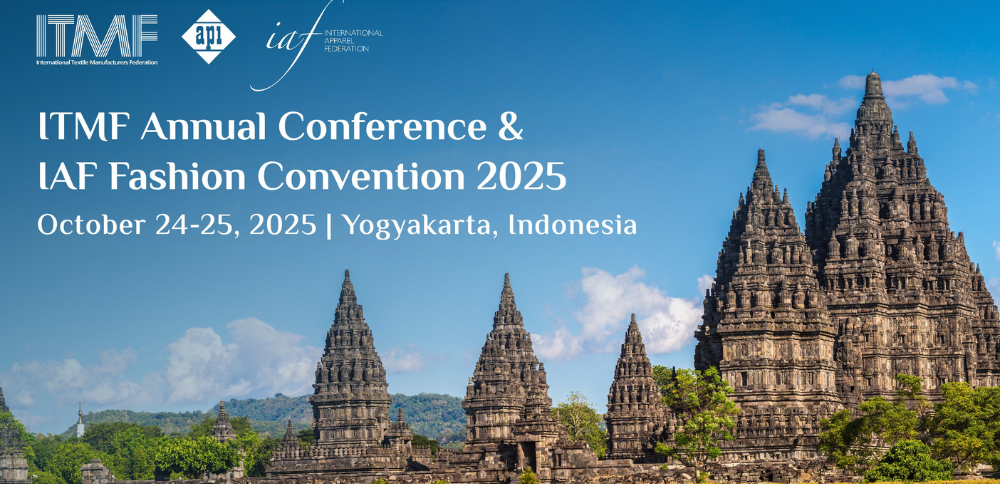FW

Social partners from Italy’s textile and fashion industry gathered in Rome on 19-20 February 2025 to discuss upcoming EU legislations and their impact on the sector. The event, part of the EU co-funded StitchTogether project, also led to the drafting of the Rome Declaration, reinforcing their commitment to a stronger social dialogue.
The meeting brought together Confindustria Moda, national trade unions (Femca-Cisl, Filctem-Cgil, Uiltec-Uil), regional clusters, and businesses. They focused on a sectoral industrial policy strategy aimed at strengthening Italy’s textile-clothing supply chain, which they plan to present to the Italian Government and the EU Commission.
The Rome Declaration outlines key priorities, including competitiveness, fair labor conditions, skills development, regional growth, and a just transition. It also calls on policymakers to support the industry's transformation amid green and digital shifts.
Judith Kirton-Darling, IndustriAll Europe’s general secretary, emphasized Italy’s significance, noting it employs 300,000 workers 24 per cent of Europe’s textile workforce. She highlighted social dialogue as a key tool to ensure job security and better working conditions.
Euratex Director General Dirk Vantyghem underscored Italy’s role, contributing 36 per cent of Europe’s textile and fashion industry. He stressed the need for a strong, innovative Italian sector as a model for Europe, where employers and workers collaborate to drive quality and creativity.
With global challenges ahead, Italy’s textile industry aims to lead the EU’s transformation with a united, forward-thinking approach.

The 40th IAF World Fashion Convention will take place on October 24-25, 2025, in Yogyakarta, Indonesia, bringing together top leaders and innovators from the global apparel and textile industry.
Following the success of last year’s event in Samarkand, which hosted nearly 400 participants from 44 countries, this year’s convention promises even greater impact. The International Apparel Federation (IAF) is once again collaborating with the International Textile Manufacturers Federation (ITMF) to create an unparalleled platform for industry collaboration, innovation, and learning.
Attendees can expect expert insights on navigating global trade shifts, adopting transformative technologies, and strengthening sustainability. High-profile speakers from leading brands like H&M, Inditex, Disney, Hugo Boss, and PVH, as well as experts from McKinsey, BCG, the World Bank, and the OECD, will share their expertise.
The event will also provide unparalleled networking opportunities with key executives, manufacturers, retailers, and policymakers shaping the global value chain. Yogyakarta’s rich textile heritage and thriving industry make it an ideal setting for exploring Indonesia’s dynamic apparel market.
More than just a conference, the IAF Convention is a catalyst for industry progress. Participants will engage in discussions that shape the future, with a strong focus on collaboration, innovation, and sustainability.

Jeanologia, a global leader in textile technology, showcased its latest sustainable solutions at the Egypt Stitch & Tex fair in Cairo from February 20 to 23. The company’s advanced innovations are set to transform textile finishing in Egypt and beyond.
At the event, Jeanologia demonstrated the synergy between its cutting-edge technologies, including laser, G2 Indra, eFlow + DB 420, and H2 Zero. These solutions are reshaping global textile production by reducing environmental impact and enhancing efficiency.
Jeanologia’s laser technology, developed over 25 years, has revolutionized textile finishing by replacing traditional, hazardous techniques. This fully automated system ensures safer operations, enhances design quality, and increases productivity. It also eliminates harmful practices, making it a game-changer for manufacturers looking to improve both safety and creativity.
Supporting the laser system, G2 Indra technology offers a sustainable finishing process that replaces water and chemical washing with air. This drastically cuts down chemical usage and water consumption. The combination of these two technologies has permanently eliminated the need for PP spray and stone washing, marking a shift toward cleaner and more efficient production methods. These advancements empower Egypt’s textile manufacturers to embrace automation, optimize resources, and align with global sustainability standards.
“Egypt’s textile industry is evolving, and our advanced laser and G2 Indra technologies meet the growing demand for efficiency, safety, and environmental responsibility,” said Mahmoud Hassan, Jeanologia’s Area Manager in Egypt. “We are proud to provide solutions that enhance production quality and set a new sustainability benchmark in the industry.”
Three decades of innovation
Founded in 1994, Jeanologia has been at the forefront of transforming the textile industry into a more ethical, sustainable, and efficient model. The company collaborates with brands, retailers, and suppliers to drive this change through disruptive technologies and innovative software.
Jeanologia’s solutions, including laser, G2 ozone, Dancing Box, eFlow, H2 Zero, and ColorBox, have redefined garment finishing by eliminating polluting processes. These innovations have significantly reduced water, energy, and chemical use, saving millions of liters of water while eliminating harmful substances.
As the company celebrates its 30th anniversary in 2025, it continues to push boundaries in sustainable textile solutions. From introducing laser technology in 1999, which revolutionized denim finishing, to its latest advancements in sustainable garment dyeing, Jeanologia remains committed to creating an eco-efficient future.
Looking ahead, Jeanologia is advancing its Mission Zero initiative, aimed at completely eliminating water and toxic chemicals from garment finishing worldwide. The company invites all industry players to join this effort and drive the transformation toward a truly sustainable textile industry.
Archroma, a global leader in specialty chemicals, is introducing its upgraded High IQ Lasting Color assurance program at Performance Days in Munich. The program meets rising consumer demand for longer-lasting garments with improved performance standards. Archroma will also showcase end-to-end solutions that help brands deliver sustainability and performance across sportswear, athleisure, and workwear.
“With a forward-thinking approach, Archroma enables brands to offer the performance and benefits consumers expect, from comfort and fit to moisture management, odor control, and long-lasting colors. Performance Days is the perfect platform to present innovations that add value in competitive markets,” said Dhirendra Gautam, VP Marketing, Archroma.
The updated High IQ Lasting Color program integrates Archroma’s latest color-retention technologies to ensure garments maintain their vibrancy. Using Avitera SE and Novacron dyes, the program helps mills and brands reduce water and energy consumption by up to 50 per cent during processing. The program also features refreshed hangtags and labels to support mills and brands in meeting industry standards.
Archroma offers a wide range of sustainable solutions tailored for sportswear, athleisure, and workwear. Its Super Systems+ suite provides fiber-specific wet processing solutions, durable colors, functional effects, and cleaner chemistries that eliminate harmful substances. Key innovations on display at Performance Days include EarthColors technology, which creates dyes from food and agricultural waste, fluorine-free Phobotex water repellents, the new Sanitized OX20 odor-neutralizing solutions, and Avitera Generation Next sustainable dyes.
Performance Days, held twice a year, attracts around 3,000 industry professionals and 500 suppliers. The March 2025 edition will take place in Munich, featuring both physical and digital exhibitors. Visitors can meet the Archroma team at Booth T17, Hall C5, Messe Munchen, from March 5-6, 2025.
nova-Institute has named Lars Borger as its new Co-CEO alongside Michael Carus, effective 1 March 2025. Borger, an expert in renewable carbon and defossilisation, will strengthen nova’s leadership as it drives the chemical and materials industry toward sustainability.
With over 30 years of experience, nova-Institute has led the transition away from fossil resources, providing research and consultancy for companies, NGOs, and policymakers. However, scaling sustainable alternatives remains a challenge, requiring the right policy framework and stronger industry commitment.
Michael Carus, nova-Institute’s founder and current CEO, welcomes Borger’s appointment, highlighting his expertise and network as key assets for accelerating transformation. Borger, formerly with BASF and Neste, brings deep experience in biopolymers, renewable polymers, and value chain management. He played a pivotal role in establishing the Renewable Carbon Initiative and served on the board of European Bioplastics.
“nova-Institute is a leading think tank driving the circular economy. I am excited to join this dedicated team and contribute to shaping a more sustainable future,” says Borger.
Together with COO Linda Engel, Borger and Carus will steer nova-Institute’s efforts in technology, sustainability, economy, and policy research, guiding industry players toward greener solutions. Engel emphasizes that Borger’s leadership aligns with nova’s mission to support companies in their sustainable transition.
With a strengthened leadership team, nova-Institute aims to drive impactful change, ensuring the chemical sector remains both competitive and environmentally responsible.
Davifil introduces Cotone Biolana OE, an innovative recycled yarn, at Filo 63. The Fall/Winter 2026/2027 collection highlights the company’s commitment to sustainability with a unique blend of recycled cotton and wool.
The cotton comes from garment scraps and fabric offcuts, while the wool is sourced from combed spinning waste. These materials are processed through open-end spinning to create an eco-friendly yarn certified by the Global Recycle Standard (GRS).
Cotone Biolana OE is available in four natural shades: Oak and Amber (brown tones) and Steel and Ash (gray tones). The darker shades (Steel and Amber) feature a 50 per cent Cotton - 50 per cent Wool composition, while the lighter ones (Oak and Ash) consist of 80 per cent Cotton - 20 per cent Wool.
Founded in 1973 in Biella, Italy, Davifil specializes in high-quality yarns for apparel, furnishings, and knitwear. The company blends innovation with sustainability, offering a diverse range of fibers, including linen, hemp, jute, wool, and silk. Using advanced spinning techniques - ring, open-end, dry, and wet spinning, Davifil ensures superior quality and versatility across its collections.
Sustainability remains central to Davifil’s mission. The company prioritizes renewable materials, eco-friendly treatments, and responsible production practices, backed by certifications like GOTS, GRS, RAF, and European Flax.
With Cotone Biolana OE, Davifil continues to push the boundaries of sustainable textiles, offering high-quality solutions without compromising environmental responsibility.
Valea Vadaleau will take over as Head of Business Development at the Aid by Trade Foundation on March 1, 2025, succeeding Christian Barthel, who retires in November after 18 years at the Hamburg-based foundation.
Vadaleau brings extensive experience in the international textile industry, specializing in sustainability and ESG frameworks. She previously led sourcing operations for Peek & Cloppenburg in Hong Kong and later advised companies on sustainable supply chains through her firm, KYBELE.
Tina Stridde, Managing Director of the Aid by Trade Foundation, welcomed Vadaleau, emphasizing her expertise in strategic planning and sustainable supply chain management. She also thanked Barthel for his dedication, noting his critical role in the foundation’s success.
Barthel, who started his career at the Otto Group in 1986, spent 26 years in Turkey and China before joining the foundation. Until his retirement, he will continue as Managing Director of ATAKORA GmbH, overseeing the marketing of sustainable cotton and cashmere standards in global supply chains.
A leading player in the textile sector, Globe Textiles reported a 53.7 per cent rise in net profit to $351,000 during Q3, FY25 as against $229, 000 in the corresponding period of the previous year. The company’s revenues rose by 46.2 per cent rise to $18.2 million during the quarter, compared to $12.5 million in the corresponding quarter of the previous year.
For 9MFY25 ended December 31, 2024, the company’s revenue increased by 20.8 per cent rise to $51 million from $42.3 million in the previous year. Their net profit increased by 56.6 per cent to $1.1 million during the period, highlighting the company’s sustained growth momentum.
Bhavik Parikh, Chairman and Managing Director, Globe Textiles, states, the company’s onsistent steady performance each quarter reflects its strategy, efficient operations, and continuous drive for growth. The acquisition of Globe Denwash, coupled with a focus on innovation, market expansion, and sustainability, has strengthened the firm’s position as a dynamic force in the textile industry. The company remains committed to delivering long-term value for their stakeholders and seizing new opportunities to enhance profits and ensure sustainable success, he adds.
Globe Textiles' steady performance is attributed to strategic initiatives, increasing demand, improved operational efficiency, and targeted market expansion. The rise in profitability is further supported by significant volume growth, effective cost optimization, and a well-defined product mix.
The company’s Growing Nevo division is set to expand its capacity for fashion-based tops, aligning with evolving market trends. Additionally, Globe Textiles is focusing on technology transfer and collaborations to enhance value for both existing and new markets. By leveraging these strategies, the company continues to adapt to changing industry dynamics while ensuring long-term sustainable growth.
Held from February 2-3, 2025 in Cairo, the inaugural Denimsandjeans Egypt exhibition attracted over 55 specialized denim industry companies from ten countries. These companies displayed cutting-edge products and innovative solutions.
The event facilitated networking and collaboration among industry insiders and experts. Seminars led by renowned speakers covered emerging trends, the future of denim, and circularity.
The two-day event attracted over 700 visitors, primarily top-tier buyers, representing more than 200 companies globally. Industry leaders showcased sustainable fabrics and advanced technologies. Global brands and retailers, including Gap, Next, Guess, Hugo Boss, Collin’s, VF Corporation, Mango, URBN, Zara, Bestseller, Miroglio, and Inditex, attended to explore new partnerships and opportunities.
The event's theme, ‘Blue Desert,’ highlighted the contrast between traditional denim and sustainable innovations, emphasizing craftsmanship and creativity.
A key feature of the exhibition was the Turkish Trend Area that showcased four distinct trends: ‘Camel Trek’ (earthy palettes and robust fabrics), ‘Eco Dunes’ (sustainable materials and finishes), ‘Mineral Fade’ (weathered looks), and ‘Sand Whisper’0 (soft hues and light washes).
Organized under the theme of ‘Blue Desert,’the Trend Area attracted attendees with innovations in the denim sector. It featured companies like Sharabati Denim, Master Textile Mills, MIC, Officina39, and Wiser Globe who displayed their latest creations.
Seminars featuring speakers like Nikita Raman, Hugo Boss; Walter Filipponi. Guess Europe, and Nicolas Prophte, Denim Deal provided insights into industry trends and innovations,.

The fashion and apparel landscape going through a transformation, says the latest Kantar BrandZ ‘Most Valuable Global Brands’ report. Luxury's digital prowess is increasing its lead, while the growing resale market is forcing brands to rethink their sustainability and circularity strategies.
Luxury’s digital mastering
The report reveals a clear trend: luxury brands are mastering the art of digital engagement, driving significant brand value growth. This digital fluency translates to seamless omnichannel experiences, immersive virtual shopping, and powerful influencer collaborations, resonating strongly with discerning consumers.
"Luxury brands have successfully leveraged digital platforms to create aspirational and engaging experiences, fostering strong emotional connections with their audiences," explains Jane Smith, Head of BrandZ Analysis at Kantar. "This digital mastery, coupled with their inherent brand equity, has propelled their growth despite economic headwinds."
For example, Louis Vuitton, a consistent leader in the BrandZ rankings, exemplifies the power of digital innovation. Their partnerships with gaming platforms, virtual fashion experiences, and engaging social media campaigns have broadened their reach and captured the attention of younger demographics. "Louis Vuitton's ability to seamlessly blend their heritage with cutting-edge digital initiatives has been instrumental in their continued success," notes Smith. "They've created a digital ecosystem that enhances the brand experience, fostering loyalty and driving sales."
The clear trends that have emerged are:
Luxury's digital drive: Brands with robust digital strategies have demonstrated significantly higher brand value growth compared to those lagging behind.
Experience over product: Consumers are valuing experiences and brand storytelling over mere product acquisition, with luxury brands excelling in this area.
Sustainability's growing influence: The report highlights a rise in consumer awareness and demand for sustainable practices, with resale and circularity gaining traction.
Resale a disruptive force
The report also sheds light on the rapid growth of the resale market, driven by increasing consumer awareness of sustainability and affordability. Platforms like The RealReal and Vestiaire Collective are challenging traditional retail models, forcing brands to consider their role in the circular economy.
"Resale is no longer a niche market; it's a mainstream phenomenon," states David Lee, a retail analyst specializing in sustainable fashion. "Consumers are actively seeking out pre-owned items, driven by both environmental concerns and the desire for unique, accessible pieces."
And brands are responding in various ways. Some luxury brands are launching their own resale platforms, aiming to control the secondary market and maintain brand integrity. Others are partnering existing resale platforms, leveraging their reach and expertise. Many are focusing on improving the durability and repairability of their products, extending their lifespan and reducing waste.
Table: Brand ranking
|
Rank |
Brand |
Key attributes |
|
Top Tier |
Nike |
Strong brand equity, digital innovation, successful athleisure positioning, and effective marketing campaigns. |
|
Top Tier |
Adidas |
Global reach, strong partnerships, focus on innovation and sustainability, and effective marketing. |
|
Mid Tier |
Zara |
Fast-fashion model, efficient supply chain, and responsiveness to trends. |
|
Mid Tier |
Lululemon |
Strong community building, high quality products, and focus on the athleisure market. |
|
Luxury Brands |
||
|
Rank |
Brand |
Key Attributes |
|
Top Tier |
Louis Vuitton |
Strong brand heritage, digital innovation, exclusive product offerings, and effective brand storytelling. |
|
Top Tier |
Chanel |
Iconic brand image, timeless design, and exclusivity. |
|
Top Tier |
Hermes |
High quality craftmanship, exclusivity, and strong brand heritage. |
|
Mid Tier |
Gucci |
strong brand recognition, and current trend setting designs. |
The Kantar BrandZ report reveals a dynamic and evolving fashion industry. Here digital innovation, sustainability, and circularity are no longer optional, they are essential for brands to thrive in the years to come. Brands that can authentically connect with consumers, embrace digital platforms, and prioritize sustainability will be best positioned for long-term success.
The report’s overarching message for fashion brands is clear: adapt or risk irrelevance. The threads of consumer preference are shifting, and brands must weave new strategies to stay relevant in a marketplace increasingly defined by digital experience and ethical consumption.












